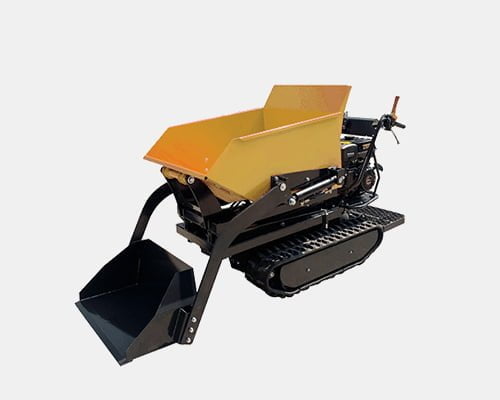Introduction

In the construction industry, efficiency is key to completing projects on time and within budget. One piece of equipment that significantly enhances job site productivity is the track dump truck. These robust machines are designed to handle rough terrains and heavy loads, making them indispensable for a variety of construction tasks. This comprehensive guide explores how track dump trucks improve efficiency on job sites, the benefits they offer, and how to choose the right model for your needs.
Understanding Track Dump Trucks
What is a Track Dump Truck?
A track dump truck, also known as a crawler dump truck, is a type of heavy-duty vehicle equipped with tracks instead of wheels. This design allows for superior traction and stability, particularly in challenging environments such as muddy, sandy, or uneven terrains.
Key Features of Track Dump Trucks
- Tracks instead of wheels: Provides better stability and traction on rough terrains.
- Heavy load capacity: Can carry significant amounts of material, reducing the number of trips needed.
- Robust construction: Built to withstand harsh conditions and heavy use.
- Hydraulic systems: Often equipped with advanced hydraulic systems for easy dumping and precise control.
Types of Track Dump Trucks
There are several types of track dump trucks, each designed for specific applications:
- Articulated Track Dump Trucks: These have a pivot joint that allows for greater maneuverability and flexibility on uneven ground.
- Rigid Track Dump Trucks: Known for their durability and ability to handle extremely heavy loads.
- Mini Track Dump Trucks: Smaller models ideal for tight spaces and smaller jobs.
Benefits of Using Track Dump Trucks

Enhanced Traction and Stability
One of the primary advantages of track dump trucks is their enhanced traction and stability. The tracks distribute the vehicle’s weight more evenly than wheels, reducing ground pressure and preventing the truck from sinking in soft or loose soil. This makes track dump trucks ideal for use in difficult terrains where wheeled vehicles would struggle.
Increased Load Capacity
Track dump trucks are designed to carry heavy loads, which can significantly reduce the number of trips needed to transport materials on a job site. This increased load capacity translates to time and cost savings, as fewer trips mean less fuel consumption and reduced wear and tear on the vehicle.
Versatility in Various Terrains
Track dump trucks can operate in a wide range of terrains, including mud, sand, snow, and rocky ground. This versatility makes them suitable for a variety of construction projects, from road building and mining to forestry and landscaping.
Improved Safety
Track dump trucks offer improved safety features compared to traditional wheeled dump trucks. The enhanced stability provided by the tracks reduces the risk of tipping over, especially when operating on uneven or sloped ground. Additionally, many track dump trucks come with advanced safety features such as rollover protection systems (ROPS) and seat belts.
Lower Ground Pressure
The lower ground pressure exerted by track dump trucks helps to minimize damage to the terrain, making them ideal for environmentally sensitive areas. This feature is particularly beneficial in landscaping and forestry projects where preserving the natural environment is crucial.
Durability and Longevity
Track dump trucks are built to withstand the rigors of heavy-duty use. Their robust construction and durable materials ensure they can handle the toughest job site conditions, leading to a longer lifespan and lower maintenance costs.
Choosing the Right Track Dump Truck
Assessing Your Needs
Before selecting a track dump truck, it’s essential to assess your specific needs and project requirements. Consider factors such as the type of terrain, the weight and volume of materials to be transported, and the size of the job site. Understanding these factors will help you choose a track dump truck that best suits your needs.
Key Specifications to Consider
When evaluating different track dump truck models, pay attention to the following key specifications:
- Load Capacity: Ensure the truck can handle the maximum load you anticipate transporting.
- Engine Power: More powerful engines provide better performance, especially on challenging terrains.
- Track Width and Length: Wider and longer tracks offer better stability and lower ground pressure.
- Hydraulic System: Look for models with advanced hydraulic systems for smoother operation and better control.
Comparing Popular Models
To help you make an informed decision, here’s a table comparing some popular track dump truck models based on key features:
| Model | Load Capacity (tons) | Engine Power (HP) | Track Width (inches) | Hydraulic System |
|---|---|---|---|---|
| Komatsu CD110R-2 | 11 | 240 | 33.5 | Advanced Hydrostatic |
| Morooka MST2200VD | 11 | 250 | 32.9 | Closed-Center Hydraulics |
| Yanmar C50R-3C | 4.4 | 67 | 17.7 | Hydraulic Pilot Control |
| Hitachi EG70R | 7 | 70 | 20.1 | Variable Displacement |
| IHI IC100-2 | 10 | 200 | 31.5 | Load Sensing System |
Cost Considerations
While track dump trucks can be a significant investment, their benefits in terms of efficiency and durability often justify the cost. Consider both the initial purchase price and the long-term operating costs, including fuel, maintenance, and potential downtime. It’s also worth exploring financing options and potential tax incentives for heavy equipment purchases.
Conclusion
Track dump trucks are invaluable assets on job sites, offering enhanced efficiency, stability, and versatility. By understanding the specific benefits and key features of these machines, you can make an informed decision that will optimize your project’s productivity and cost-effectiveness.
FAQ
Q: What are the main differences between track dump trucks and wheeled dump trucks?
A: Track dump trucks have tracks instead of wheels, providing better traction and stability on rough or soft terrains. They also exert lower ground pressure, reducing damage to the terrain. Wheeled dump trucks are generally faster and more suitable for smooth, paved surfaces.
Q: Can track dump trucks be used in all weather conditions?
A: Yes, track dump trucks are designed to operate in various weather conditions, including rain, snow, and mud. Their tracks provide superior traction, making them suitable for use in adverse weather.
Q: How do I maintain a track dump truck?
A: Regular maintenance of a track dump truck includes checking and adjusting track tension, inspecting and lubricating the hydraulic system, monitoring engine performance, and performing routine oil and filter changes. It’s also important to clean the tracks and undercarriage to prevent buildup of debris.
Q: Are there any specific safety precautions for operating track dump trucks?
A: Safety precautions for operating track dump trucks include wearing appropriate personal protective equipment (PPE), conducting pre-operation inspections, using seat belts and rollover protection systems (ROPS), and adhering to load limits. Operators should also be trained in proper handling techniques and aware of the job site conditions.
Q: What is the lifespan of a track dump truck?
A: The lifespan of a track dump truck depends on various factors, including the model, usage intensity, maintenance practices, and operating conditions. With proper maintenance, track dump trucks can last several years, often exceeding a decade of service.
By thoroughly understanding the benefits and selecting the right track dump truck for your needs, you can significantly enhance the efficiency and success of your construction projects.

